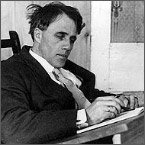The poetry is lost in not translating
 Poetry is the first thing lost on translation. --Robert Frost
Poetry is the first thing lost on translation. --Robert FrostPoetry is what is gained in translation. --Joseph Brodsky
Poetry is what gets transformed. --Octavio Paz
These are quotes commonly cited whenever the subject comes up.
All three poets, of course, are correct, because it depends on the translation. Certainly the music of the original language cannot be replicated. But the imagery can get very close. And with a very sensitive, mystically-oriented translator, the special essences of the poem can come through, those glimmer shots that go far beyond language and intellect, but move as ancient must-bes through the open windows of constructs, that suddenly arrive speared and fattened into readers hearts, and that overtake focus and awareness like impending death. This leads to the truth of Brodsky, that we can gain poetry from a so-gifted translator, and the hopeful truth of Paz, that a given poem is transformed using the music of a new language.
Let's take one step back to Brodsky for just a minute, and allow me to throw my hat into the spirit of how he put it, for poetry is what gets lost when there is no translation. When this is the case, when superb or "worthy" poetry is not translated, the entire state of humanity becomes one more step less than whole, one more step toward serious global misunderstanding and destruction, or at least one more step toward lives being less fulfilled than they could have been.

In the Tower of Babel picture from Maciejowski Bible we see that just as we poets are stricken with Adam's Curse to have to work hard at our craft, poet/translators are as cursed through the spirit of The Tower of Babel. Neither curse means we should give up, but that we have much important work to do to empower humanity. Not to do it, is to develop into a more horrible state of affairs than we have now on this planet.
Here are links to three poems in translation, selected because the originals are there to view, and they are not to be missed:
Karin Henderson's "Svartdalsveien" or "Oslo By A Different Road"
Ramin Farahani's "Oevers van pijn" or "Edges of Pain"
Lucía Estrada's "LVII"
Those three poems are from FireWeed, MR Zine, and Poetry International Web, respectively, and the latter, PIW, being filled with poems in translation. Zeek is carrying a monthly series of translated poems by lesser-known Israeli poets. Here is a link to the latest:
Rahel Chalfi's "The Water Queen of Jerusalem".
And, just to cross both time and culture, here is a translation of an old song poem:
Sayataca's Night Chant
2 Comments:
You might find this interview interesting, over at Magnapoets . Mukul Dahal talks about translating poems from Nepalese into English.
Hi Christine,
Excellent interview. Thank you.
I was reminded in it that English is used as the central place that brings people of other languages together. At the same time, the cultures behind English can be so overwhelming, that it can send other languages into disuse.
Within the interview, I also found the link to Mukul Dahal's Pen Himalaya.
Bud
Post a Comment
<< Home